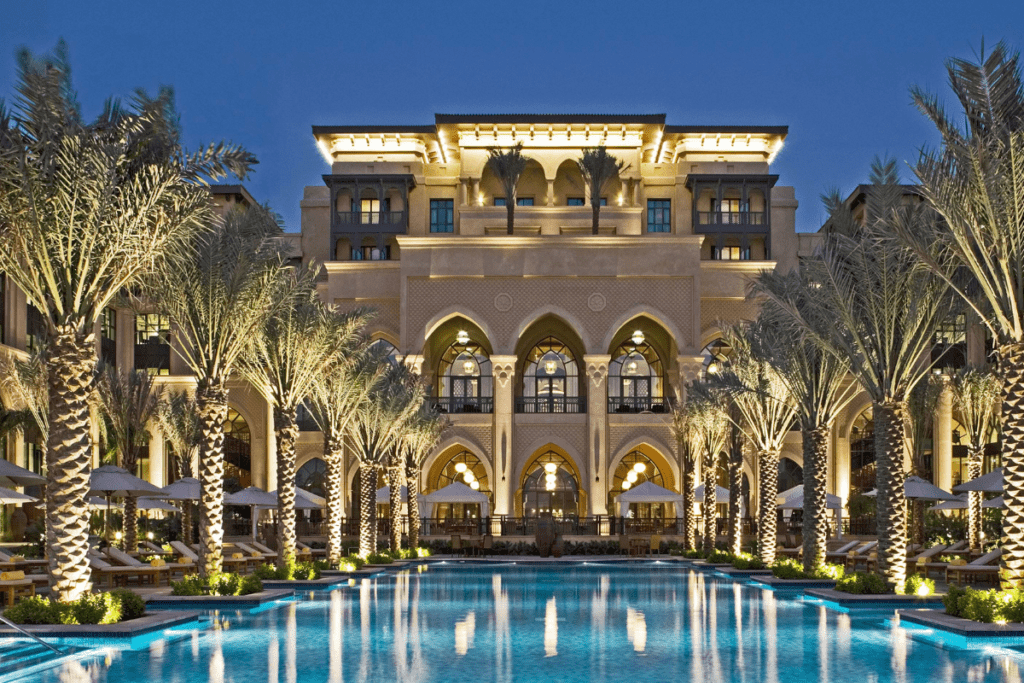There are also 5-star stays listing at Dh500 and lower.
Dubai hotel room rates have dropped from their New Year peaks, but there is still sustained demand running all the way until end March because of the Expo. Until then, occupancy rates will continue at 2019 levels as the global event draws to a close on March 31.
After that, there will be “the expected Ramadan dip in April, and summer seasonality will come into play with occupancies lower,” said Philip Wooller, Area Director for Middle East & Africa at STR. Even then, “it will be similar to 2021 – the year should then finish off strong from the third quarter onward.”
Hotel rates are seen falling in the coming week with some of the city’s premium hotels such as the Kempinski in Mall of the Emirates and Dubai Marina’s Intercontinental offering rooms for about Dh1,000 a night. A room at the JBR-located Habtoor Grand Resort is available for just Dh990 after January 10, compared to the peak New Year rate of close to Dh5,000.
Although more than half of the city’s prime hotel properties are still fully booked, there are more budget options available. Deira’s Radisson Blu has rooms starting from just Dh388, while Dusit Thani, located in the Trade Center area, has a starting rate of over Dh550.
February rate indicators
Rooms rates will see a slight bump in the first week of February, with Taj Dubai in Business Bay and Jumeirah Mina A’Salam charging in the range of Dh1,000-Dh1,700 a night.
There are solid bargains too on luxury stays. The Meliá Desert Palm hotel will cost guests around Dh580, and the Retreat Palm Dubai MGallery by Sofitel around Dh900 plus.
“The challenge for Dubai in 2022 will be to create enough demand in fourth quarter to match the spectacular effect from Expo during that same period in 2021,” said Wooller. “The FIFA World Cup in Qatar in December will no doubt put the Middle East in the global spotlight once again.”
Football’s biggest tournament may bring in more than a million tourists to Qatar and will result in overspill demand to key transit hubs Dubai and Abu Dhabi.
Omicron uncertainty
The rising Omicron cases worldwide will also require the travel and tourism sector to rethink strategies. “The earlier prospects of what looked like a clear and steady path to normalization are likely to see increasing headwinds,” said Shady Elborno, Emirates NBD analyst, in a research note. “So far, all the tourism statistics for Dubai released through November, prior to the global onset of the Omicron variant, point to very robust recovery across key tourism metrics.”
As per the last available data, hotel numbers have been doing well. Occupancy in Dubai surged to 85.7 per cent in November from 80.7 per cent in October, and 67.2 per cent in September, according to STR.
All-round boost
Revenue per available room (RevPAR) was up a robust 15 per cent month-on-month in November, marking the fourth straight rise in the metric. “The hotel sector in November benefited from a combination of factors led by Expo 2020, improving COVID-19 metrics (pre-Omicron), a pick-up in international tourism footfall, and a busy schedule of events and conferences,” said Elborno.
Expo 2020 has crossed the half-way mark, with almost 9 million visits during its first three months, organizers said last week. Since opening on October 1 last, a total of 8,958,132 visits have been recorded, boosted by events across the December festive season. More sport, music and cultural performances are expected in the second-half of its total six-month run.
(Except for the headline, this story has not been edited by The Finance World staff and is published from a syndicated feed.)


